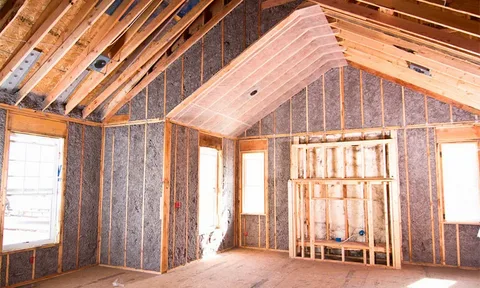When it comes to keeping your home comfortable and energy-efficient, roof insulation plays a crucial role. It helps regulate the temperature inside, prevents heat loss in winter, and keeps your home cool during the scorching summer months.
But what about the costs involved? This blog post dives into roof insulation Adelaide costs, what you can expect, and how to budget effectively.
Understanding Roof Insulation
Before we delve into the costs, let’s briefly understand what roof insulation is all about. Roof insulation involves adding a material layer to your roof’s surface or within its structure to prevent heat transfer. This additional layer is a barrier against outside temperatures, making your home more energy-efficient.
Factors Affecting Roof Insulation Costs
The cost of roof insulation can vary depending on several factors. Here are some key factors that can impact the overall cost:
1. Material Type
Different types of materials are available for roof insulation Adelaide, such as fiberglass, cellulose, spray foam, and rigid foam boards. Each material has its pros and cons in terms of effectiveness and cost. The material you choose will influence the overall cost of installation.
Fiberglass insulation is one of the most commonly used materials for roof insulation. It is cost-effective, easy to install, and provides good thermal performance. However, it may require additional protective measures to prevent moisture buildup.
Cellulose insulation is made from recycled paper and treated with fire-retardant chemicals. It is an environmentally friendly option and provides excellent thermal performance. However, it is slightly more expensive than fibreglass insulation.
Spray foam insulation is a popular choice for its superior insulating properties. It creates an airtight seal, preventing any heat loss or gain. However, it is the most expensive option and requires professional installation.
Rigid foam boards are lightweight and durable. They offer good thermal resistance and are resistant to moisture and pests. However, they are more expensive than other insulation materials.
2. Roof Size and Complexity
The size and complexity of your roof also play a significant role in determining the cost. A larger roof will require more materials and labour than a smaller one. Additionally, if your roof has multiple angles or slopes or requires any repairs before installing insulation, it may increase the overall cost.
3. Contractor Rates
The rates charged by contractors can vary based on their expertise and location. Researching and comparing quotes from different contractors is essential to find an option that fits within your budget without compromising quality.
Estimating Roof Insulation Costs
Now that we have an idea about the factors affecting roof insulation costs let’s discuss how to estimate the expenses involved:
1. Research and Gather Quotes
Start by researching different insulation materials and their associated costs. Reach out to multiple contractors specialising in roof insulation and request detailed quotes based on your specific requirements. It’s essential to provide accurate information about your roof size and any complexities or repairs needed to get a precise estimate.
2. Calculate Material Costs
Once you have received the quotes, calculate the material costs for each option. Consider factors like durability, energy efficiency, and long-term savings potential when deciding. Choosing a material that offers good wall insulation Adelaide properties while fitting within your budget is essential.
3. Account for Labour Expenses
Labour costs can significantly contribute to the overall expenses of roof insulation. Factor in the estimated labour charges the contractors provide while budgeting for your project. Choosing a contractor with experience and expertise in roof insulation is important to ensure a quality installation.
4. Additional Costs
Don’t forget to account for any additional expenses that may arise during the installation process. This could include scaffolding, disposal fees, or any repairs required before installing insulation. Having a buffer in your budget is important to cover any unforeseen costs.
Budgeting Tips
Here are some helpful tips to keep in mind while budgeting for your roof insulation project:
– Plan Ahead: Start saving early and set a realistic budget based on your research and quotes received. Giving yourself enough time to gather information and make informed decisions is important.
– Get Multiple Quotes: Compare quotes from different contractors to ensure you get a fair price for materials and labour. Don’t hesitate to ask for references and check their previous work.
– Consider Long-Term Savings: While upfront costs may seem high, remember that energy-efficient insulation can significantly save heating and cooling bills in the long run. Consider the long-term benefits when making your budget.
– Explore Financing Options: If the initial cost seems overwhelming, look into financing options or government rebates that could help offset some expenses. Many utility companies offer programs to incentivise energy-efficient upgrades.
Conclusion
Roof insulation is an investment in your home’s comfort and energy efficiency. By understanding the factors influencing roof insulation Adelaide costs and effectively budgeting for your project, you can make informed decisions aligning with your needs and financial capabilities. Remember to research different materials, gather multiple quotes, and account for all potential expenses before embarking on your journey toward a well-insulated roof.




